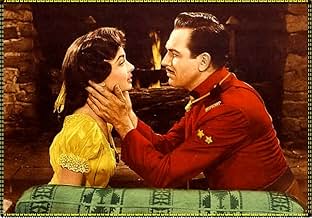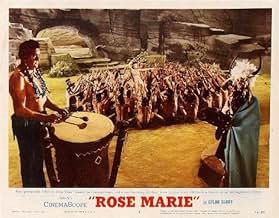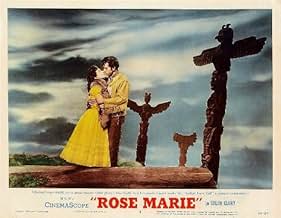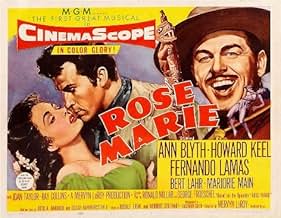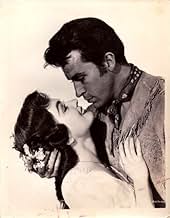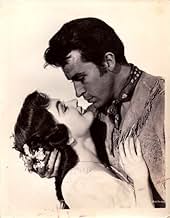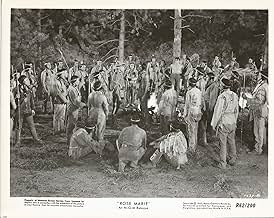Rose Marie, una chica salvaje, tiene aventuras en la vida y el amor cuando el Mountie Mike Malone la saca de la naturaleza.Rose Marie, una chica salvaje, tiene aventuras en la vida y el amor cuando el Mountie Mike Malone la saca de la naturaleza.Rose Marie, una chica salvaje, tiene aventuras en la vida y el amor cuando el Mountie Mike Malone la saca de la naturaleza.
- Dirección
- Guionistas
- Elenco
Dorothy Adams
- Townswoman
- (sin créditos)
Fred Aldrich
- Woodsman in Saloon
- (sin créditos)
Robert Anderson
- Corporal
- (sin créditos)
John Angelo
- Man at Charity Dance
- (sin créditos)
Emile Avery
- Mountie
- (sin créditos)
Walter Bacon
- Man at Charity Dance
- (sin créditos)
Al Bain
- Woodsman in Saloon
- (sin créditos)
Margaret Bert
- Townswoman
- (sin créditos)
Chris Willow Bird
- Indian
- (sin créditos)
Oscar Blank
- Woodsman in Saloon
- (sin créditos)
Opiniones destacadas
Bears little resemblance to the (better) MacDonald/Eddy version, at least what little I can remember of it. Very much in the style of musical that MGM would do for the better part of the 50's, for better and worse. As such, it was fine. Would have improved had they cut the entire Duval/Wanda subplot and just focused on Howard Keel and Ann Blyth. Busby Berkeley worked on the staging of the musical sequences --his last major theatrical film until 1962's Jumbo-- but there was really only one short sequence which clearly bore his fingerprints: the one involving the Native American medicine man (Thurl Ravenscroft, best known for How the Grinch Stole Christmas) and a group dance centered around Wanda. In retrospect, considering Berkeley's Hollywood career as just about over, this was a fitting bookend to someone whose very first Hollywood job was on the Eddie Cantor musical, Whoopee!, faint echoes of which appeared in that aforementioned sequence. Aside from that sequence, the best part of the film was a comic number by Bert Lahr, doing a more up-tempo variation on his big number from The Wizard of Oz ('If I Were King of the Forest'). For me, this lost steam about two-thirds of the way through and never really recovered. And I didn't like the ending either. Well-produced, but still rather middling.
when i saw Rose Marie i fell in love with it. it is a fantastic love story done in the mountains and with great songs, Indian Love Call is one of the best love songs i have heard. The scenery in the movie is to make you want more and want to be their. It is a fantastically done movie and the combination of Howard Keel and Ann Blyth was the best for this movie, since i saw this movie in 1955 i have never forgotten it and I have been looking for either a video or a DVD of this movie for many years. Please, please lets put this fantastic movie on DVD so that i may have a copy to join my other musicals of that era. They do not make movies like these any more. So again i beg of you please, please put with wonderfully fantastic movie on to DVD, so those of us who want it so much can have it.
10sdiner82
Why hasn't this MGM musical ever gotten the acclaim it deserves? The CinemaScope/Eastman Color cinematography of the Canadian Rockies serves as a dazzling backdrop for a rousing Mounties adventure saga. Which also happens to feature a gloriously composed and sung score--Ann Blyth and Fernando Lamas's rendition of "Indian Love Call" is enthralling. Check this out the next time it shows up on Turner Classic Movies. Like "River of No Return" (with Mitchum & Monroe--shot the same year in the same breathtaking locale), it was one of the first films to exploit the new anamorphic process in its full glory--and has never been surpassed.
With a deliciously hilarious romantic subplot involving those two comedic geniuses, Marjorie Main and Bert Lahr. What more could one want? As Howard Keel sings to Blythe in the course of the title song, "Rose Marie I love you" . . .
With a deliciously hilarious romantic subplot involving those two comedic geniuses, Marjorie Main and Bert Lahr. What more could one want? As Howard Keel sings to Blythe in the course of the title song, "Rose Marie I love you" . . .
I well remember seeing this movie when it was shown in New Zealand about 1955. It was an enjoyable movie and my desire to own it on DVD was only heightened when I recently saw it on Turner Classic Movies. Regrefully most TCM movies in New Zealand are a bit blurry and the sound track had lots of 50/60 cycle hum in it. It would be nice if it was to be released on DVD particularly if a little care was taken in restoring the visual print and the sound track.
The original sound track for Rosemarie was a magnetic 3 channel across the screen and 1 surround channel. With modern sound restoration and enhancement equipment that is available today, there is no reason why this could not be restored to quiet a presentable 5.1 sound track.
It disappoints me to see many of the fine old movies reissued with excellent visual print but little care having been taken on the sound restoration when as a sound engineer specializing in old recorded sound restoration I know much better could be done.
The original sound track for Rosemarie was a magnetic 3 channel across the screen and 1 surround channel. With modern sound restoration and enhancement equipment that is available today, there is no reason why this could not be restored to quiet a presentable 5.1 sound track.
It disappoints me to see many of the fine old movies reissued with excellent visual print but little care having been taken on the sound restoration when as a sound engineer specializing in old recorded sound restoration I know much better could be done.
In this third film of Rose Marie and probably the last one we'll ever see, every single version of the film is different to each other and to the plot of the original Broadway show. Since operettas are a thing of the past I doubt another version would be made. Where would you get voices like Ann Blyth, Howard Keel and Fernando Lamas?
This version has Ann Blyth as Rose Marie, a trapper's daughter now alone out in the woods. Though she's pretty capable of taking care of herself, those in authority don't see it that way. Mountie Howard Keel brings her into what passes for civilization in the Canadian west at the turn of the last century.
Keel's seeing Ann in a whole different light when she puts on a dress, but trapper Fernando Lamas will take her any old way, so Ann's got to choose between them.
The main songs from the 1936 version make it here, you couldn't really do Rose Marie without Indian Love Call, The Mountie Song or the title number. Rudolf Friml wrote some other nice songs for the original Broadway production which didn't make it into the classic Nelson Eddy/ Jeanette MacDonald version or this one.
Friml contributed some new songs in what would turn out to be his next to last songwriting assignment and they're well suited for the voices that have to sing them. Otto Harbach and Oscar Hammerstein, II did the original lyrics for Broadway, but in this Paul Francis Webster collaborated with Friml and provided the words.
For comic relief we have Marjorie Main and Bert Lahr, playing something along the lines of a cowardly Mountie. But actually he proves to be of invaluable help to Howard Keel.
Keel in his memoirs was not originally satisfied with the Mountie part, feeling he was written like a Dudley DooRight idiot in the first draft. Some considerable rewriting was done before he went before the camera.
He also tells of a practical joke that second unit director Howard Koch pulled on director Mervyn LeRoy by having Jack Benny show up in a Mountie uniform and mess up the takes of the Mountie Song. Benny and LeRoy were good friends and when LeRoy realized who it was, he broke up and shooting was done for the day.
Busby Berkeley got some work in this film, staging the Totem Tom Tom number. There are words to the song, but you won't hear any in this or in the earlier one. Totem Tom Tom is nicely choreographed. I'm always amazed at how Rudolf Friml who studied under Anton Dvorak in Prague before coming to America was able to capture the American Indian rhythm with that song.
This 1954 version of Rose Marie has enough merit to it that it does not suffer comparison with what Nelson and Jeanette did back in the day. Fans of operetta will like it, even devoted Eddy/Mac people.
This version has Ann Blyth as Rose Marie, a trapper's daughter now alone out in the woods. Though she's pretty capable of taking care of herself, those in authority don't see it that way. Mountie Howard Keel brings her into what passes for civilization in the Canadian west at the turn of the last century.
Keel's seeing Ann in a whole different light when she puts on a dress, but trapper Fernando Lamas will take her any old way, so Ann's got to choose between them.
The main songs from the 1936 version make it here, you couldn't really do Rose Marie without Indian Love Call, The Mountie Song or the title number. Rudolf Friml wrote some other nice songs for the original Broadway production which didn't make it into the classic Nelson Eddy/ Jeanette MacDonald version or this one.
Friml contributed some new songs in what would turn out to be his next to last songwriting assignment and they're well suited for the voices that have to sing them. Otto Harbach and Oscar Hammerstein, II did the original lyrics for Broadway, but in this Paul Francis Webster collaborated with Friml and provided the words.
For comic relief we have Marjorie Main and Bert Lahr, playing something along the lines of a cowardly Mountie. But actually he proves to be of invaluable help to Howard Keel.
Keel in his memoirs was not originally satisfied with the Mountie part, feeling he was written like a Dudley DooRight idiot in the first draft. Some considerable rewriting was done before he went before the camera.
He also tells of a practical joke that second unit director Howard Koch pulled on director Mervyn LeRoy by having Jack Benny show up in a Mountie uniform and mess up the takes of the Mountie Song. Benny and LeRoy were good friends and when LeRoy realized who it was, he broke up and shooting was done for the day.
Busby Berkeley got some work in this film, staging the Totem Tom Tom number. There are words to the song, but you won't hear any in this or in the earlier one. Totem Tom Tom is nicely choreographed. I'm always amazed at how Rudolf Friml who studied under Anton Dvorak in Prague before coming to America was able to capture the American Indian rhythm with that song.
This 1954 version of Rose Marie has enough merit to it that it does not suffer comparison with what Nelson and Jeanette did back in the day. Fans of operetta will like it, even devoted Eddy/Mac people.
¿Sabías que…?
- TriviaJoan Crawford, who played Ann Blyth's mother in El suplicio de una madre (1945), played the title role in the original 1928 version of this film, which is now considered lost.
- ErroresContrary to what is written on the DVD jewel-box, the "Totem Tom-Tom" number doesn't appear in this version of the operetta. It was replaced by the Totem Dance that is seen in the film.
- ConexionesFeatured in MGM/UA Home Video Laserdisc Sampler (1990)
- Bandas sonorasRose Marie
Music by Rudolf Friml
Original Lyrics by Otto A. Harbach and Oscar Hammerstein II
Revised Lyrics by Paul Francis Webster
Performed by Howard Keel; reprised by Bill Lee and the Mounties
Selecciones populares
Inicia sesión para calificar y agrega a la lista de videos para obtener recomendaciones personalizadas
- How long is Rose Marie?Con tecnología de Alexa
Detalles
- Tiempo de ejecución1 hora 44 minutos
Contribuir a esta página
Sugiere una edición o agrega el contenido que falta


